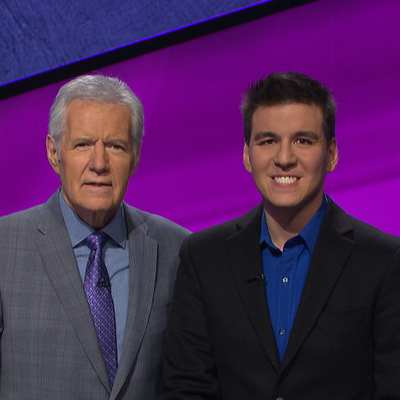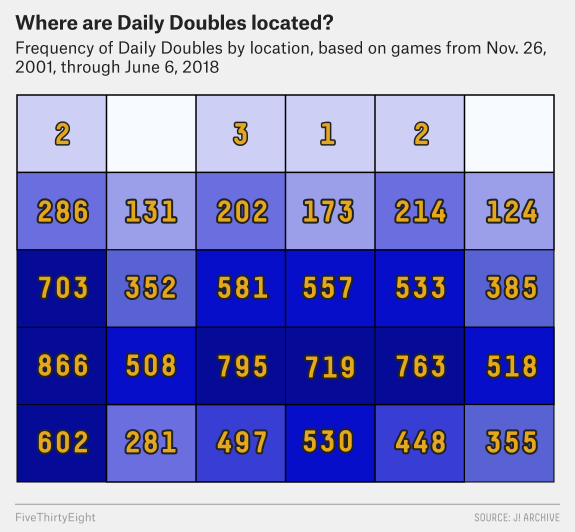
It’s unusual when a legacy media brand cracks the half century mark and is stronger than ever. Yesterday, our blog post explored the growing number of rock stations celebrating their golden anniversaries. But something amazing is happening with one of TV’s biggest game show successes – Jeopardy – now in its 55th year on television.
The venerable A&Q show (“Be sure to phrase your responses in the form of a question”) was created by TV icon Merv Griffin (who also launched Wheel of Fortune). The show was originally named What’s The Question? but in a brainstorm meeting, a network executive mentioned the game needed “more jeopardies.” As Merv wrote in his autobiography, “I didn’t hear another word. All I could think of was the name: Goodbye What’s The Question, hello Jeopardy.”
Alex Trebek took over hosting duties in 1984 when the show was revamped. More than just a liner-card jock, Trebek brought his charm and aplomb to Jeopardy. Think of him as the show’s “morning guy,” the steady force behind the game for well more than three decades.
So, on a true classic like Jeopardy, how could anything truly new and novel happen? Aside from little tweaks along the way, the show has remained remarkably consistent.
But in the last three weeks, the game has turned upside down, thanks to a young, daring, innovative contestant, James Holzhauer. A professional sports gambler, Holzhauer may be breaking Jeopardy, having won more than $1.3 million over the last 18 shows. (Ironically, Holzhauer had a close call last night, but managed to stave off his best competitor yet.)
Consider this: it took the all-time winner, Ken Jennings, 74 consecutive wins back in 2004 to rake in more than $2.5 million. Suffice it to say, the 34 year-old Holzhauer is “in the zone,” as it is said about basketball players who seemingly can’t miss a shot. He now owns all the top single day records for most money won, and continues to shatter his own records.
It’s no accident, however. In fact, Holzhauer has used his gambling acumen and emotional training to “game the game.” In much the same way the Oakland A’s redefined baseball metrics (a topic we discussed here last week), Holzhauer analyzed Jeopardy and has systematically changed the way the game is played.
A story in Nate Silver’s FiveThirtyEight about this phenomenon broke down some of the available Jeopardy data, much of which has been no doubt studied by the analytical Holzhauer. This chart shows the incidence of “Daily Doubles” on the board over a long period of time:

Not surprisingly, Holzhauer always goes for the biggest $1,000 answers in the opening round, quickly racking up big totals, and intimidating his competitors. As a result, he routinely finds those “Daily Doubles” because he’s playing on the lower part of board. And then, Holzhauer maximizes his production by often going all in when wagering on those rare betting opportunities, despite the possibility of losing his entire stash. More often than not, he has won the game before “halftime.”
As in poker, having a lot of chips (cash) early in the game can be an advantage. But Holzhauer has an emotional edge as well. As a gambler, he routines has good days – and bad ones. As he told The New York Times, “The fact that I win and lose money all the time helps desensitize me, so I can write down $60,000 as the ‘Final Jeopardy’ wager and not be trembling at the thought of losing that money.”
Of course, Holzhauer is highly intelligent – but so are all the contestants on Jeopardy. The way he studies trivia also differs from the norm. To retain his interest and alleviate boredom, he gravitated to children’s books:
“What is the place in the library I can go to get books tailored to make things interesting for uninterested readers? Boom. The children’s section.”
Now, imagine that radio’s programming rules could be challenged by an out-of-the-box thinker like Holzhauer. Like on Jeopardy, consider the rules or “best practices” have been in place for decades on most stations across the format and market spectrums.
For so many years, commercial loads have run conventionally high, most often broken up into two stopsets typically falling in the either the bow tie or hourglass formats. There are still scads of mind-numbing caller #9 contests on the air, along with all those text-to-win keyword giveaways.
 Add to that the same benchmarks showing up on multiple morning shows in the same markets. Dayparts still tend to be standardized, time and weather checks continue despite their digital presence everywhere. Nights and weekends are almost devoid of imaginative programming or amazing DJs because of the conventional wisdom those dayparts don’t matter or don’t produce much in the way of revenue.
Add to that the same benchmarks showing up on multiple morning shows in the same markets. Dayparts still tend to be standardized, time and weather checks continue despite their digital presence everywhere. Nights and weekends are almost devoid of imaginative programming or amazing DJs because of the conventional wisdom those dayparts don’t matter or don’t produce much in the way of revenue.
Because that’s the way we’ve always done it.
When you think of truly innovative radio strategies, like KNDD’s “Two Minute Promise,” they are often too few and far between. Like those  thousands of contestants on Jeopardy over the years, most radio stations are doing variations on the same theme. Alan Almond’s Pillow Talk show was like no other AC show back in the 70s. And it broke all the rules when KEZ (Phoenix) first took their shot on all Christmas music three decades ago.
thousands of contestants on Jeopardy over the years, most radio stations are doing variations on the same theme. Alan Almond’s Pillow Talk show was like no other AC show back in the 70s. And it broke all the rules when KEZ (Phoenix) first took their shot on all Christmas music three decades ago.
The list of all these radio “isms” go on and on – just like they did on Jeopardy until a young gambler showed up earlier this month, perhaps changing the way the game is played forever. Until someone else comes along and tries something different.
If you’ve been a fan of Jeopardy over the years, the game still has compelling moments, but very little drama. You pretty much know the way it’s going to go, how the players are going to bet, and how “Final Jeopardy” will likely play out. That’s not the case now.
Whether you’re rooting for Holzhauer to continue his amazing streak of consecutive wins and massive piles of cash, or you’re had enough of this “getting-more-arrogant-with-each-win” guy, there’s a reason to watch Jeopardy again.
An unintended consequence of Holzhauer’s amazing streak and even bigger dollar amounts is the belief among many he’s breaking Jeopardy‘s budget. A story in The Atlantic by Joe Pinsker – “‘Jeopardy’ Wasn’t Designed for a Contestant Like James Holzhauer” – reports the average single day winnings at around $20,000. That’s now out the window because Holzhauer has won well more than six figures on several individual shows.
But don’t feel sorry for the producers of Jeopardy. Thanks to James Holzhauer’s rule-bending strategies, there’s now a huge amount of attention and buzz on the show, not to mention higher ratings, as millions tune in to see if this thirtysomething gambler can break even more records.
Hey, maybe it’s time for those Jeopardy sales reps to raise the rates.
- What To Do If Your Radio Station Goes Through A Midlife Crisis - April 25, 2025
- A 2020 Lesson?It Could All Be Gone In A Flash - April 24, 2025
- How AI Can Give Radio Personalities More…PERSONALITY - April 23, 2025




Innovative ideas and actions must be greeted by a community of radio pros who CELEBRATE innovation. In Australia, for example, they give their “Marconi” awards to BEST NEW FORMAT, BEST NEW MORNING HOST, BEST NEW …….. We give ours to, “Legendary”
Rather than meeting new ideas with the worst response possible, “Who else is doing it?” the response should be “It might work, let’s think how to make it work…”
There are some station owners who seek innovation such as Press Broadcasting’s Robert McAllan. Bob didn’t blink when I formulated a crazy idea—NEW JERSEY 101.5 or REAL RADIO 104.1 Orlando. Cash machines today. It wasn’t even a struggle, Bob just said, let’s do it.
You’ve got to figure that if Holzhauer was listed on the NY Stock Exchange, the risk management committee of his company would not allow him to take such chances.
If one were to welcome innovation, it can be top down or from the ground up. Fred Jacobs (and Walter Sabo) are two of the brightest in the business. They are of one mind. When innovation plays, innovation wins.
They work from the top down. Out here in the fields, in a studio on the North edge of the SF Bay Area, every Sunday for the last 11 years, my boots are on the ground. With a mic to crack open and a playlist to tweak, every week is different. Yes, the core (Classic Rock) songs are heard. So are tracks that produce the “Oh, wow” factor. Thematically. Playfully. The skill is in framing. Going beyond calls, slogan, song titles, say your name, read the liner, pre-sell, hit the spot cluster ad nauseum. Taking a risk to “say something real.” Have analytics involving listeners lives. What’s going on? Engage in it.
That Daily Double breakdown from Nate Silver is telling. The big playoff is not by standard rote, the easy questions then down in each category. It’s going deeper and out in left field.
You’re absolutely right about nights and weekends! When I worked for the NextRadio app, we developed case studies that prove radio’s working around-the-clock. Stations could make money by uncovering who’s listening and then pitching this audience to the right advertisers. And why not think branded content if the avails are there? The key is we can’t give away timeslots and innovative creative approaches as “value add.”
Reading about Holzhauer (I wasn’t aware of his streak because I haven’t watched “Jeopardy!” in years), I realized that he is the modern-day descendant of Michael Larson, who beat the “Press Your Luck” board back in 1984 by memorizing which squares the whammys were in, which squares had the “big bucks”, and the sequence of the not-so-randomized lights selecting the squares.
This isn’t the same, of course … Holzhauer simply knows that the odds are in his favor playing the $1000 answers first. And there is more to his skill set than just that, because he has to have the broad knowledge to provide the correct questions to keep control of the board.
If Holzhauer had an inclination for it, he’d make a good radio programmer, I think. He’d be able to intelligently estimate the odds of a particular move gaining and keeping listeners, and he definitely would be a fan of research and learn how to apply it for best results.
By comparison, Larson is the PD who schedules music entirely based on where a song charted on the Hot 100 when it was a current. I know you’ll get the analogy, Fred.